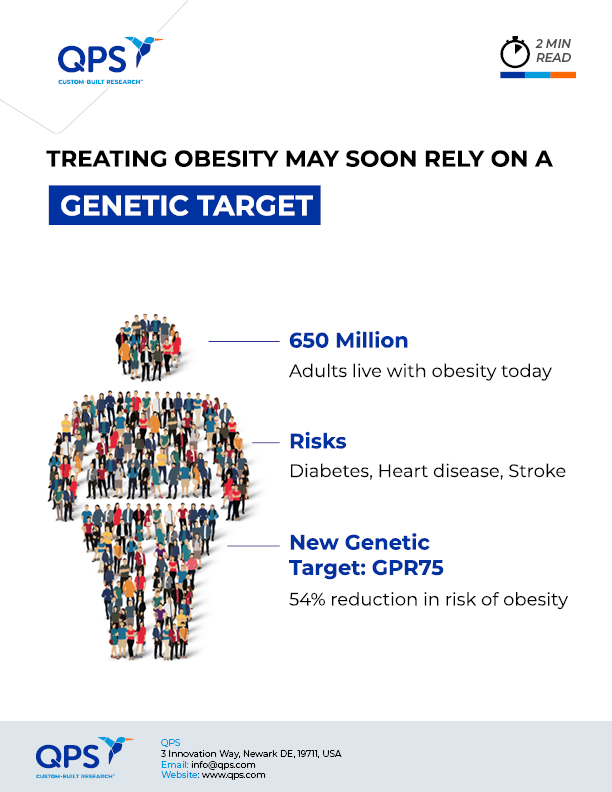An estimated 650 million adults live with obesity today, which puts those individuals at increased risk for some of the leading causes of death worldwide, including diabetes, heart disease, stroke, and some types of cancer. Most prescription weight-loss drugs work by decreasing appetite or providing a feeling of satiety to help people lose weight. The exception is orlistat, which impedes fat absorption. This summer, the U.S. Food and Drug Administration approved the first new obesity drug since 2014 – semaglutide – which helped clinical trial participants with a BMI of 27 or higher lose as much as 12.4% of their body weight when combined with diet and exercise. This new therapy offers a significant increase in body weight loss over the average 3 to 7% associated with older therapies. But according to a new study published in Science, treating obesity may soon rely on a genetic target.
The Promise of a Game-Changer
Scientists from Regeneron Pharmaceuticals sequenced exomes of almost 650,000 people from the United Kingdom, United States and Mexico. The sequencing revealed a protective ‘loss of function’ GPR75 mutation in one out of every 3,000 people sequenced. Individuals with at least one inactive copy of the GPR75 gene weighed, on average, 12 pounds less than the rest of the population, with a 54% reduction in risk of obesity. There was also evidence of an association with glucose lowering.
Based on these insights, Regeneron plans to target GPR75 using a range of therapeutic approaches including antibodies, small molecules, and gene silencing. The biotech has recently announced a partnership with AstraZeneca to research, develop and commercialize small molecule compounds directed against the GPR75 target with the potential to treat obesity and related comorbidities. With Regeneron’s expertise in genetics and AstraZeneca’s knowledge of chemistry and small molecules, the collaboration can enable a game-changing therapy in an area in great need of innovation.
A Goal of Treatments Offering Both Efficacy and Safety
With regulatory agencies highly focused on safety profiles, attempts at therapeutics to treat obesity have often resulted in failure. Despite this, Regeneron remains convinced that its genetics center will point the way to the big blockbusters of the future.
“The next era of drug development is being fueled by important genetic findings that direct drug developers on how to deploy our toolkit of biologics, small molecules and gene editing technologies,” says Dr. George D. Yancopoulos, Regeneron’s President and Chief Scientific Officer. “Regeneron is excited to join forces with AstraZeneca, as we seek to develop new medicines tackling the harmful and costly obesity epidemic.”
Establishing a Clear Genetic Link
“While the behavioral and environmental ties to obesity are well understood, the discovery of GPR75 helps us put the puzzle pieces together to better understand the influence of genetics,” says Dr. Christopher Still, director for the Geisinger Obesity Research Institute at the Geisinger Medical Center. “Further studies and evaluation are needed to determine if reducing weight in this manner can also lower the risk of conditions commonly associated with high BMI, such as heart disease, diabetes, high blood pressure and fatty liver disease.”
The conclusion of the study published in Science captures the significance of the findings, stating the inhibition of GPR75 “illustrates the power of massive-scale exome sequencing for the identification of large-effect coding variant associations and drug targets for complex traits.” This game-changer in obesity treatment has the potential to reduce the impact of numerous comorbidities, and may be the first of many new options for patients.
Did you enjoy this blog post? Check out our other blog posts as well as related topics on our Webinar page.
QPS is a GLP- and GCP-compliant contract research organization (CRO) delivering the highest grade of discovery, preclinical and clinical drug research development services. Since 1995, it has grown from a tiny bioanalysis shop to a full-service CRO with 1,100+ employees in the U.S., Europe and Asia. Today, QPS offers expanded pharmaceutical contract R&D services with special expertise in neuropharmacology, DMPK, toxicology, bioanalysis, translational medicine and clinical development. An award-winning leader focused on bioanalytics and clinical trials, QPS is known for proven quality standards, technical expertise, a flexible approach to research, client satisfaction and turnkey laboratories and facilities. Through continual enhancements in capacities and resources, QPS stands tall in its commitment to delivering superior quality, skilled performance and trusted service to its valued customers. For more information, visit www.qps.com or email info@qps.com.







